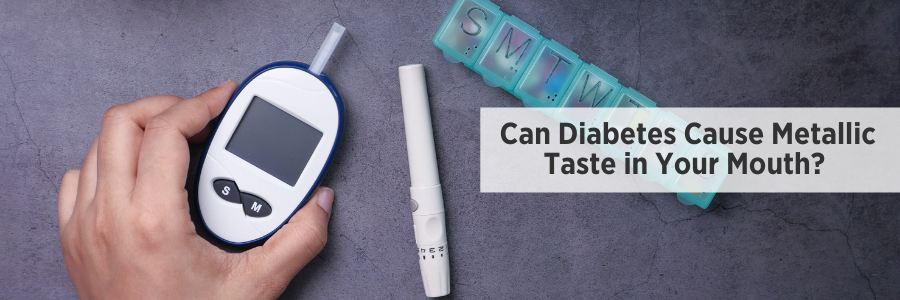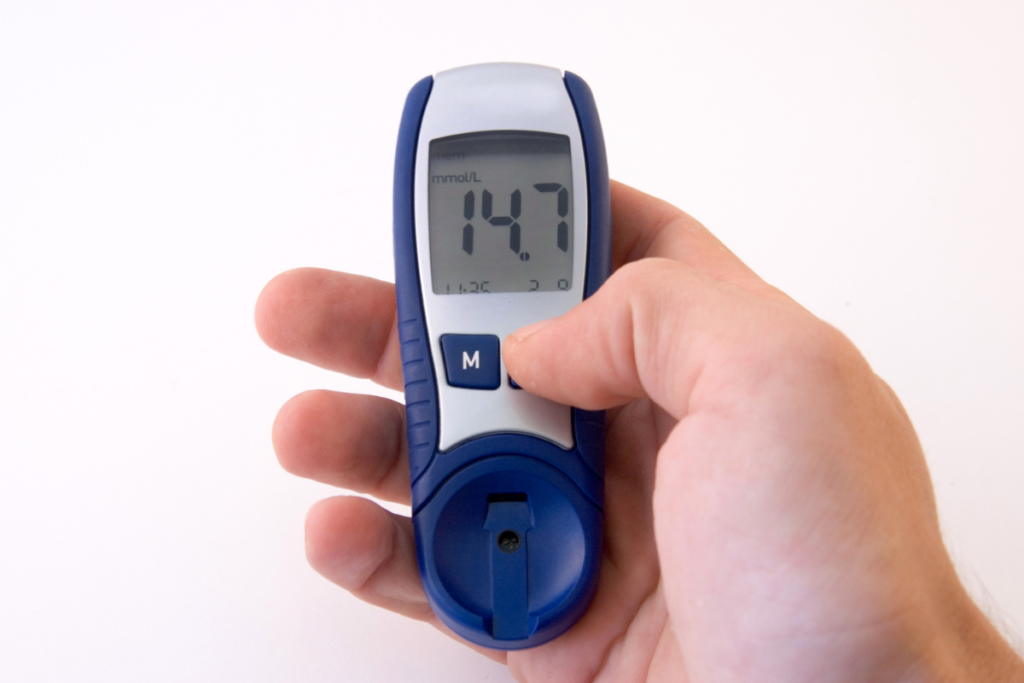

If you have diabetes, it is important to keep your blood sugar within a healthy range. In the event that your blood glucose levels become too high, you may notice a funny, irritating metallic taste in your mouth. This metallic taste is medically known as dysgeusia. Diabetes and metallic taste can be related to other causes as well, such as certain medications.
Chronic high blood sugar levels are indicative of diabetes. The food you consume breaks down into sugar (glucose) and is released into your bloodstream. As your blood sugar increases, the pancreas will release insulin. Insulin’s role in the body is to convert this sugar into energy.
Unfortunately, diabetes prevents the body from making enough insulin or does not utilize the insulin properly. This insufficient amount or improper use of insulin leads to an excess accumulation of sugar in the bloodstream, causing diabetes.
Metallic taste in the mouth can be related to diabetes. The most common causes include:

Metformin is a prescription drug used to treat Type 2 diabetes. Metformin works by lowering blood sugar levels to a safe range. Although metformin helps stabilize blood sugar levels, it can also leave the unpleasant side effect of metallic taste in the mouth.
Diabetes causes high blood sugar in the body. Prolonged high blood sugar can cause damage to nerves in the body. Parageusia is a taste disorder that occurs when there is injury or damage to the central nervous system. When these nerves become damaged, taste disturbances, such as metallic taste, may develop.


Diabetic tongue is a combination of xerostomia, or dry mouth, and too much sugar in the saliva. Diabetic tongue can trigger a condition known asoral thrush. Oral thrush occurs when fungus starts to grow rapidly in the gums, tongue, and the roof of the mouth. Oral thrush often results in secondary burning mouth syndrome, which, in turn can cause metallic taste in the mouth.
High blood sugar levels increase the sugar level in saliva. When your saliva contains high sugar levels, your oral health will become compromised. High sugar levels in saliva can increase your risk for cavities, gingivitis, and periodontitis. These can all cause metallic taste in the mouth.

People suffering from metallic taste may experience a decrease in their quality of life. Metallic taste can often cause poor nutrition, as it causes aversion to certain foods because the food tastes unpleasant or different. This also often leads to people eating less or making poor nutritional choices.
To mask the unpleasant taste caused by dysgeusia, people choose to eat spicier, saltier, or overly sweet foods. As a result of this, sodium and sugar intake often increase and can lead to complications or cause additional health problems.
One study also showed that some dysgeusia patients begin drinking excess amounts of water. This can create a risk of polyuria, incontinence and higher risk of falls in the elderly.
Metallic taste resulting from diabetes may improve over time. If the metallic taste is due to medication, metallic taste should subside once your body adjusts to the medication. Adjusting your dosage may also help improve metallic taste.
Controlling your diabetes is essential in eliminating metallic taste. Keeping your blood sugar stable can help reduce the chance of developing metallic taste. For immediate relief of metallic taste, MetaQil Oral Rinse is specifically designed to restore your sense of taste and eliminate metallic taste caused by diabetes and other causes.
MetaQil is an innovative mouth rinse designed to provide comfort to those who suffer from taste disorders. Our unique sugar-free formula includes xylitol, a low calorie, very low glycemic index sweetener, known to help manage diabetes, weight, and tooth decay. Our formula also contains monk fruit extract. Monk fruit extract contains anti-inflammatory properties to prevent oral diseases in the mouth as well as add a natural antioxidant sweetening agent. MetaQil is alcohol and sugar free, and safe for those with diabetes.
MetaQil is the #1 solution for symptomatic relief of metallic taste. MetaQil’s scientifically designed formula alleviates metallic taste caused by chemotherapy, GERD, and a variety of medications. MetaQil gently cools the mouth and provides instant, long-lasting relief from metallic taste symptoms. It has a mild flavor and does not “sting” the mouth like an every-day mouthwash. Regular use of MetaQil can help patients return to healthy eating and adequate nutrient intake.
For best results, use approximately 5 ml (one teaspoon) of MetaQil®, rinse for 30 seconds, and spit out. MetaQil can be used on an as-needed basis. Use alone or after each time you brush your teeth
Important: If you are pregnant or breastfeeding, please consult your physician before using MetaQil. Do not use MetaQil if you are taking any medications that are contraindicated with the product. Please consult with your physician if you have any concerns regarding the use of this product. Keep out of reach of children.
For more information about MetaQil, click here.